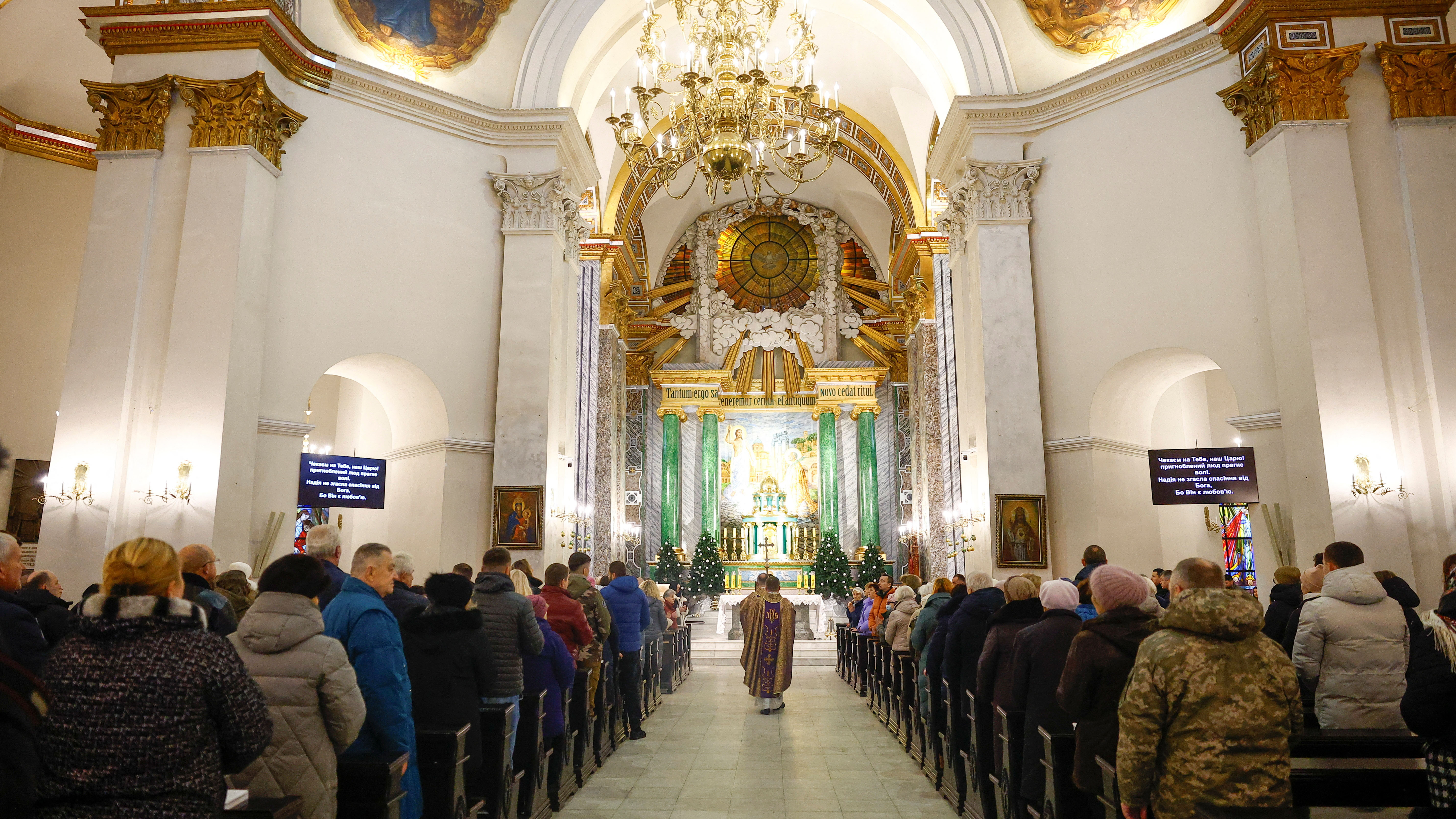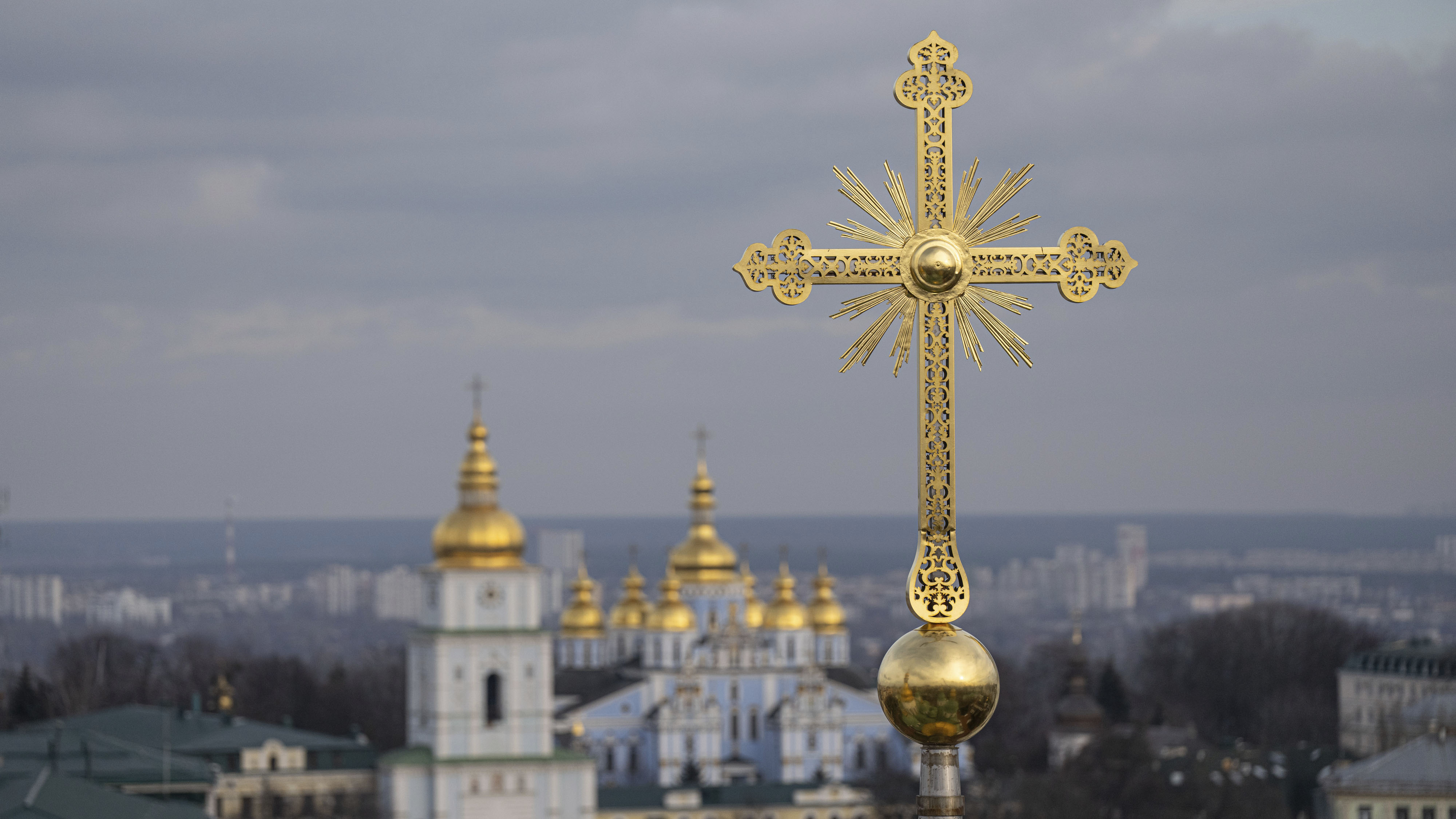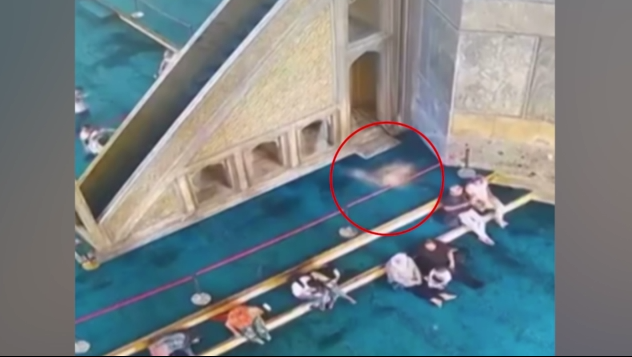
He would paint mountains, hermits’ cells, and the sky
“We went to the monastery from the side opposite the entrance, went up the slope, and from there we saw the monastery. It was sunset, and it seemed to all of us that we were seeing the real Jerusalem… We were sure that’s what it was. And Fr. Daniel sang the sticheron, ‘Let God arise, let His enemies be scattered… Shine, shine, O New Jerusalem’” recalls one of Fr. Daniel Sysoev’s friends about a pilgrimage to New Jerusalem Monastery. “It was autumn. We were standing before New Jerusalem, and Fr. Daniel was singing about it, and we contemplated this beauty.”
In his childhood, the future priest would paint unknown countries, where there were mountains, waterfalls, hermits’ cells, and villages with people below. There were cross processions going throughout the streets, and in every village there were several churches.
“The main thing was space, the sky. He always drew it, with some incredible sparkle,” recalls Fr. Daniel’s mother Anna. As a preschooler he knew about the book Byzantine Legends about the saints almost by heart.
During the Paschal services, Fr. Daniel radiated so much joy that he overwhelmed all his parishioners. But even on the most ordinary days, he was always smiling and laughing. According to many of his friends, he didn’t like to be alone; he could easily become the life of any company, and there were always guests at his place. People who knew him closely recall Fr. Daniel’s childlike simplicity.
“Fr. Daniel would be crossing the street, reading the Bible”
 A moleben before a missionary class, February 2008. Photo: Ekaterina Zagulyaeva
A moleben before a missionary class, February 2008. Photo: Ekaterina Zagulyaeva
“The first time I saw Fr. Daniel on the street, he was arguing with sectarian agitators, and it struck me that he knew the Bible practically by heart. The way he used the Bible, it was clear he read it constantly,” said Miloserdie.ru journalist Iliya Agafonov. “Working on some material, you could call him at any time and ask what the Holy Fathers or Russian spiritual authorities said on this or that question. He would immediately give an answer.”
Fr. Daniel was characterized by incredible erudition already in seminary. One day the inspector started scolding him for communing “too often.” “On the basis of the canons, sayings of the Holy Fathers, and liturgical texts and priestly prayers, which were generally unknown to us then, Daniel easily proved that man is called to commune at every service,” recalls Fr. Alexei Lymarev.
In the same way, as a seminarian he knew the liturgical typikon and strove to observe it exactly. “We had certain relaxations, that he really wanted to correct. For example, when he would read the canon, he always read it on six troparia, as in the typikon, not on four,” said Archpriest Mikhail Schepetkov. “We even called him the ‘Walking Typikon.’”
Fr. Daniel reread the Bible his whole life. “I’d be heading for the metro and I’d see Fr. Daniel crossing the street, reading the Bible, sometimes bumping into passersby,” said Elena Krylova, a friend of the Sysoev family.
“Listen how beautiful the Paschal stichera are!”
 The bloody cross of Fr. Daniel. Photo: pitanov.livejournal.com
The bloody cross of Fr. Daniel. Photo: pitanov.livejournal.com
“We often build Christ around our lives, but for him Christ was the center, and he built everything on Him,” recalls Archpriest Igor Fomin.
“He was a man completely immersed in faith. As they said about the Old Testament righteous ones that they ‘walked before God’—you could basically say that about Fr. Daniel,” shares Iliya Agafanov. “He was always standing before God in his words and deeds.”
He expected the same boundless faith from others. Elena Krylova, a friend of Fr. Daniel’s family, gave birth to a premature baby, and the baby was in the ICU. Matushka Julia called her: “Hold on, we’re coming to baptize your son!” “Batiushka brought a bottle of holy water with him, very cold because it was freezing outside,” recalls Elena. “I was very scared, because my baby had pneumonia, and pouring ice-cold water on him could make him worse. ‘What, don’t you believe in God?’ Fr. Daniel sternly asked me. I couldn’t argue, and they baptized my child, and he immediately started getting better.”
Any conversation with Fr. Daniel, however it started, would turn into a conversation about God, about the need to serve Him and to become like Him, his friends recall.
And he could talk on theological topics in any situation: while walking to the metro, while sorting potatoes in the kitchen, or balancing on one foot in a rolled-up pants leg, washing the other one in the sink.
He could stop a classmate in the seminary hallway and say: “Listen, listen, how beautiful the Paschal stichera are!” and start singing the Byzantine melody.
He didn’t want tolerance
 Missionary course, February 2008. Photo: Ekaterina Zagulyaeva
Missionary course, February 2008. Photo: Ekaterina Zagulyaeva
“There were no authorities for him. He could publicly argue with anyone, fearing nothing, even a professor, if he believed he was mistaken about something,” recalls Archpriest Dionysiy Pozdnyaev.
Seminarian Daniel Sysoev could even get himself involved in a discussion during a lecture, which would sometimes get him in trouble. But that didn’t stop him from starting theological disputes again and again.
Later, there were thousands of meetings, broadcasts, debates, and round tables in his life. He took part in discussions with Muslims, sectarians, and neopagans. In his youth, according to his wife, he “boiled with zeal for God,” though he later learned to debate more calmly. But he always remained offputtingly straightforward.
“He didn’t want tolerance; he didn’t want Christ to be put on the same level as Mohammed, Buddha, or Jehovah, and for people to pray to them,” recalls Fr. Alexei, Fr. Daniel’s father.
Many things concerning heterodoxy, sins, or delusions aren’t acceptable to say out loud. But Fr. Daniel always finished his thought out loud. Speaking, for example, at a scientific conference, he could say that science could be “the servant of theology.”
Thanks to his recklessness, Fr. Daniel earned himself somewhat scandalous fame. One Muslim journalist even appealed to the Prosecutor, demanding to bring a case against him for inciting interreligious and interethnic enmity.
Throughout his life, Fr. Daniel baptized more than eighty Muslims, including several Wahhabis, and two people who were planning to become Shahids; and more than 500 Protestants.
It was normal for him to wear a cassock at all times
 Fr. Daniel talking with a Jehovah’s Witness in Kyrgyzstan, June 2008. Photo: Ekaterina Zagulyaeva
Fr. Daniel talking with a Jehovah’s Witness in Kyrgyzstan, June 2008. Photo: Ekaterina Zagulyaeva
Fr. Daniel was always a missionary. He didn’t turn into ordinary “citizen Sysoev” in the evening or on weekends.
“We lived near each other, and we drove home together after the services several times,” recalls Archpriest Vladimir Shmaly. “He’d show me: ‘There’s a beer stand I go to to have some beer with the guys and talk about Christ.’”
“I asked him: ‘Fr. Daniel, listen, is it normal that you ride the metro in a cassock and walk down the street in a cassock? That means anyone can approach you!’ ‘Yes, anyone.’ I think he never took his cassock off. He believed it was important—to always be in a cassock, because a priest is a soldier of Christ.”
One day Fr. Daniel managed to save a woman who was planning to commit suicide. She started talking with him on the street precisely because of his priestly clothing.
“Even hooligans in the metro, who pestered him about how he was dressed, he answered in such a way that it turned into a homily about faith and God,” says Evgeny Kudashov, a Sysoev family friend.
Fr. Daniel could, without hesitation, organize a moleben in a public place meant for completely different purposes: in an airport, on the ruins of a Crusader fortress, etc.
With the blessing of the hierarchy, he served molebens in the Tatar language, and would go preach at Sabantuy celebrations.1
In the Seliger youth camp, he missionized among the Chechen participants, and in Moscow, he would take “excursions” to places where migrant workers lived crowded together.
“Don’t be afraid, I’ll intercede for you to be glorified as martyrs”
 The Church of the Apostle Thomas, several hours after the murder of Fr. Daniel, November 20, 2009. Photo: Deacon Andrei Radkevich
The Church of the Apostle Thomas, several hours after the murder of Fr. Daniel, November 20, 2009. Photo: Deacon Andrei Radkevich
In 2007, Fr. Daniel organized a missionary course at the Church of the Apostle Thomas, and urged other priests to do the same at their parishes. Before attending sectarian meetings, he instructed missionaries like this: “Split up one by one. Carefully listen to the preaching and ask your neighbors clarifying questions. Point out the contradictions between what the pastor says and the Bible. Your task is to point out the discrepancies without scaring them off.”
“Fr. Daniel saw missionaries as the military detachment of the Church, armed with knowledge of the Word of God,” recalls Ekaterina Zatulyaeva, a correspondent for Neskuchny Sad magazine. She went with Fr. Daniel’s group to Kyrgyzstan in 2008.
“We had to go to a certain mountain Muslim village, known for its radical tendencies. Our task was to secretly baptize a dying woman—it was her own desire.
“Before taking off, Fr. Daniel joyfully admonished us all: ‘Don’t worry at all if they kill you there—I’ll intercede for you to be glorified as martyrs,’” Ekaterina says.
Seraphim Maamdi, an Orthodox Kurd, recalls how Fr. Daniel proposed that he organized a trip to Iraqi Kurdistan (the center of Yezidism, a religion based on Zoroastrianism) to preach about Christ. “I said that … a martyr’s crown would be provided for me, since the radicalism of the people of Iraq is known to the whole world.
“But Fr. Daniel said there was nothing to be afraid of—they threatened to behead him fourteen times, and are we really going to retreat out of fear?” he said.
“Our sole and eternal homeland is Heaven”
 Fr. Daniel’s funeral, November 23, 2009. Photo: Deacon Andrei Radkevich
Fr. Daniel’s funeral, November 23, 2009. Photo: Deacon Andrei Radkevich
“The best death for a Christian is, of course, martyrdom for Christ the Savior. This is best death possible for a man in principle,” Fr. Daniel wrote in his book Instructions for the Immortal, or What to Do If You Still Die.
He didn’t just want to be saved, but he dreamed of martyrdom. “He said it was wrong to think, ‘If only I could be at least on the edge of Paradise.’ ‘On the edge’ was too little for him,” says his wife Julia.
Fr. Daniel constantly received threats from radical Islamists, Satanists, and so on. When his friends urged him to be careful, reminding him about his children, he would answer that the Lord and Most Holy Theotokos wouldn’t abandon the family of a martyr.
“I asked him one time: ‘Don’t you like it here? The way you behave, this could all come crashing down at once.’ And he responded: ‘It’s much more interesting there!’” recalls Archpriest Oleg Stenyaev.
“Our sole and eternal homeland is Heaven. There lives our Father; there are our fellow citizens—the saints; there the Church finds eternal rest after a long war with the devil,” Fr. Daniel said in an interview with Neskuchny Sad magazine.
Preaching on the streets in Moscow, Tuva, and the Caribbean
 Planning a missionary trip to Kyrgyzstan. Photo: Ekaterina Zagulyaeva
Planning a missionary trip to Kyrgyzstan. Photo: Ekaterina Zagulyaeva
“Fr. Daniel proved himself not just a preacher, a missionary, but also an organizer of parish life,” Fr. John Popadinets, the rector of the Church of the Apostle Thomas told Miloserdie.ru.
“The Church of the Apostle Thomas was built on an empty spot. There weren’t even any residential buildings next to it. He gathered people, started serving, and a community developed. He founded a missionary school and a missionary movement in honor of the Prophet Daniel.”
The school and movement still exist. Missionaries go out on Sundays to missionize on the streets, distributing leaflets and trying to speak with whomever wants to about faith and about God. “Thanks to these labors, many people have come to the Church,” noted Fr. John.
“When Fr. Daniel died, we decided ourselves to finish the missionary courses he taught. We just turned on his audio recordings and studied that way,” Viktor Kupriyanchuk, head of the Moscow branch of the Prophet Daniel Missionary Movement, told Miloserdie.ru.
They managed to revive the missionary school at the Church of the Apostle Thomas only in 2011. They give lessons on dogmatics and apologetics, and there are also special courses on various religions from a missionary point of view, about how to have discussions with them. “Fr. George Maximov, Andrei Sokolov, Fr. Oleg Stenyaev, and others taught us,” Viktor added.
The missionaries don’t only preach on the streets, but also among the homeless at the Moscow Center for Social Adaptation. Missionary branches have arisen in Nizhny Novgorod, Voronezh, Vyatka, and Crimea. The Voronezh activists have gone to preach the Gospel in Tuva, and several of them even moved there to serve as missionaries. There have also been trips abroad, including to the Philippines and the island of Dominica in the Caribbean.
There’s another Orthodox missionary school, part of the Russian Church’s Synodal Missionary Department, that also considers Fr. Daniel Sysoev its founder. It’s led by the rector of the Theophany Cathedral in Elokhov, Archpriest Alexander Ageikin.2
After Fr. Daniel’s death, his wife Julia founded the Матушки и Дети (Priests’ Wives and Kids) charitable foundation, which helps the widows and children of deceased priests.
***
Fr. Daniel Sysoev was born on January 12, 1974, in Moscow, in a teacher’s family. In 1991, he entered the Moscow Theological Seminary. On January 22, 1995, he married Julia Brykina. The Sysoev family has three daughters.
In 1995, Fr. Daniel was ordained a deacon. He held Biblical talks starting in August 1996. He did distance learning at the Moscow Theological Academy. In 2001, he was ordained to the priesthood and appointed a cleric of the Church of the Apostles Peter and Paul in Yaseveno, Moscow.
He dreamed of building a church in honor of his Heavenly patron the Prophet Daniel, the community of which was formed earlier from participants in the Biblical discussions. The stone church is still under construction, and the wooden Church of the Apostle Thomas connected to it was built in November 2006.
Fr. Daniel wrote many books, participated in discussions with sectarians, neopagans, and Muslims, and he was often invited to various TV shows. He led missionary trips to Tatarstan and Kyrgyzstan.
 Φωτ. Reuters
Φωτ. Reuters Φωτ. AP
Φωτ. AP
















